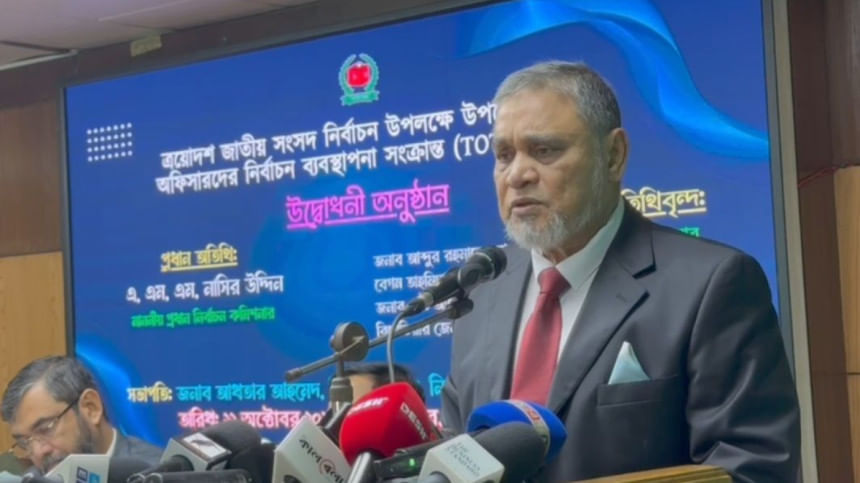CEC warns UNOs to stop scuffles, protect ballot boxes without delay

Chief Election Commissioner (CEC) AMM Nasir Uddin today urged upazila nirbahi officers (UNOs) not to bow to any pressure or influence while carrying out their election duties, and to remain firmly guided by the law."The Election Commission will not bow to any unjust pressure," he said. "You must not bow to any pressure or coercion, and must remain steadfast in your decisions according to the law."The CEC made the remarks this morning at a training programme on election management for UNOs at the...
Chief Election Commissioner (CEC) AMM Nasir Uddin today urged upazila nirbahi officers (UNOs) not to bow to any pressure or influence while carrying out their election duties, and to remain firmly guided by the law.
"The Election Commission will not bow to any unjust pressure," he said. "You must not bow to any pressure or coercion, and must remain steadfast in your decisions according to the law."
The CEC made the remarks this morning at a training programme on election management for UNOs at the Election Training Institute in Agargaon, Dhaka, ahead of the upcoming 13th national parliamentary election.
He warned that mobile magistrates often arrive only after incidents have taken place.
"By the time they reach, scuffles may have ended, polling centres seized, ballot boxes taken. You must ensure that does not happen."
He stressed the need to build a culture of respect for the law in Bangladesh, saying a nation is more civilised the more it upholds the law.
"We are dreaming of a new Bangladesh. One of the root causes of our misery is that we do not show enough respect for the law," he said. "We want the rule of law, not rule by law."
Nasir Uddin said the Election Commission is committed to delivering a fair and acceptable election. "Whatever duties you are assigned, carry them out justly, legally, neutrally and professionally," he told the UNOs.
He further emphasised the importance of coordination.
"Since you are engaged at the upazila level, the responsibility of coordination largely rests with you. This coordination is extremely important."
He also called for strong cooperation with law enforcement agencies, presiding and polling officers, and central, district and monitoring cells.
"You must pursue this overall coordination very seriously."
Meanwhile, Election Commissioner Md Anwarul Islam Sarkar today told UNOs that there is "no reason to be afraid" ahead of the upcoming 13th national parliamentary election.
"After August 5, the administration went through a period of uncertainty -- some would claim authority and give conflicting instructions. You certainly faced difficulties, but now, by and large, many problems at the upazila level have been overcome."
He urged the UNOs to recognise their authority: "At this stage, who is the most powerful officer? The Upazila Nirbahi Officer. You may not always realise it while sitting on your chair, but you hold real authority. Please also pay attention to minor repair works at the polling centres under your jurisdiction."
Addressing concerns about the upcoming period, he said, "I saw in today's newspapers an attempt to create an atmosphere of a caretaker government. The message from the Election Commission is clear -- there is no reason to be afraid. Do your job properly; the Election Commission stands with you."
He warned, however, that deliberate wrongdoing would have consequences: "If anyone acts with ill intent or carries out any task unfairly for a particular purpose, you will face serious trouble. If any problem arises in the field due to deliberate wrongdoing, you will not be spared. And whatever resources or funding you need to carry out your duties properly will be provided."
Speaking about postal ballots, Election Commissioner Abul Fazal Md Sanaullah said, "We have taken the postal ballot system online. The application is currently in its trial run. We hope to launch it for public use around mid-November—specifically on November 16."
He added that during the last (12th) national parliamentary election, a total of 435 people cast votes through postal ballots.
Urging magistrates to treat the election as a top-priority task, he said, "This time, let us truly realise the importance of this election. This is probably one of the most consequential elections in our nation's history. Whatever other responsibilities we may have, we should treat this as our priority duty in the field. The administration must foster an atmosphere where it works strictly and impartially."